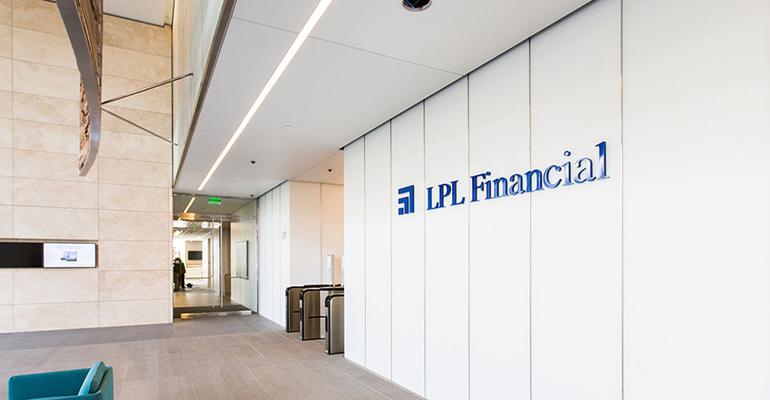The following is a contributed opinion piece from a Wealthmanagement.com reader and former LPL representative.
By James E. “Jeb” Bashaw
I spent 13 years at LPL. They were some of the happiest times in my life. I actually rang the bell at the NASDAQ.
But LPL has lost its way with its clients. Leadership is using words and phrases like “pivot,” “paradigm shift,” “build momentum for ourselves” and “100 wins in 100 days.” Those all look great in an executive leadership retreat handbook at The Breakers resort, but LPL advisors have no interest and certainly no ownership in this discussion—economically, systemically or culturally.
 Those are LPL issues—and LPL is a vendor, not an employer. What LPL advisors want to hear is “we’re sorry,” “we screwed up,” “we’re going to fix it,” and “thank you for your business.” I am no longer at LPL, I have moved on to greener pastures, to a world where the client is always first.
Those are LPL issues—and LPL is a vendor, not an employer. What LPL advisors want to hear is “we’re sorry,” “we screwed up,” “we’re going to fix it,” and “thank you for your business.” I am no longer at LPL, I have moved on to greener pastures, to a world where the client is always first.
Here are the five things I believe LPL should consider changing—in order of importance (which could save LPL $20 million in consulting fees):
- Culture: Stop treating advisors like employees or, worse, adversaries. The advisors are the clients. When Todd Robinson founded the firm, his goal was to offer a better solution for advisors. In the early days of LPL, every meeting between LPL home office and advisors ended with the phrase, “Thank you for your business.” Today, if you look at LPL’s website, Todd Robinson isn’t even listed—it just references “founders.” As soon as LPL sends out the word to its home office employees that the advisors are “clients” and not “employees” and works for them, not the other way around, things may begin to turn.
- Compensation: The compensation structure is a misnomer. LPL doesn’t have a “90 percent payout.” (Ninety is the maximum you can start at before they begin to charge you for everything from “Branch Trading” reports to the Branchnet tools.) The correct nomenclature should reflect the true nature of the relationship, which is: the advisors hire LPL; the advisors pay LPL 10 percent of their revenues; and LPL provides clearing, trading, data access and compliance at an additional fee. You see, LPL has no clients except advisors. Don’t believe me? Call the home office and tell them you’d like to open an account.
- Technology: “Fixing” Branchnet and changing the name to “Clientworks” is a parlor trick. The real fix is the same one I provided years ago to the head of technology: Call Fidelity, Schwab and Pershing; send out a request for proposal; and negotiate the best price you can. It’s what those firms do best. LPL can cut their headcount by 1,000 people, their costs by $200 million and improve the quality of their client experience. Advisors/clients don’t care about “LPL self- clearing,” they care about LPL caring.
- Recruiting: Align your advisors/clients with your recruiting goals, objectives and compensation. If the mantra in our industry is “our best referrals come from our clients,” why wouldn’t LPL roll out a recruiting plan that engages their 14,000 advocates? LPL pays outside recruiters 6 percent of the trailing 12 months. They pay inside recruiters hundreds of thousands of dollars in salary and compensation. They pay their advisors/clients who refer new advisors to them at a whopping 1 percent of the trailing 12. I didn’t go to Wharton or Harvard, but it looks to me like this is an upside down plan with a message sent to the advisors/clients that LPL doesn’t need you or more people like you.
- Leadership: LPL has a revolving door at the “C” level. If you want to be the best, you better hire the best. “A” players hire “A” players and “B” players hire “C” players. So hire folks who have actually worked with independent advisors and end user clients, not mid-level retreads from wirehouses who don’t have the first clue about what being an independent advisor is all about. It’s that simple. Since Todd Robinson left, LPL has lost its entrepreneurial spirit. Its leadership went from a visionary, to a bureaucrat, to a technocrat. Given the outflow of advisors (including Ron Carson), its apparent the system is broken. Twenty-seven years ago, United Airlines did a great commercial about being fired by a client and friend of 20 years because they no longer talked face-to-face anymore—just sent faxes and answered telephone calls. At the end of the commercial, an executive asks the CEO where he was going. His reply: “to visit that old friend who fired us this morning.”
James E. “Jeb” Bashaw is an independent advisor at International Assets Advisory LLC, an independent broker/dealer in Orlando, Fla. He was with LPL for 13 years. He recently lost a securities arbitration claim against LPL.
The views and opinions expressed in this article are those of Jeb Bashaw and do not reflect the views or opinions of International Assets Advisory.





